
Morocco: Women's Expedition Itinerary
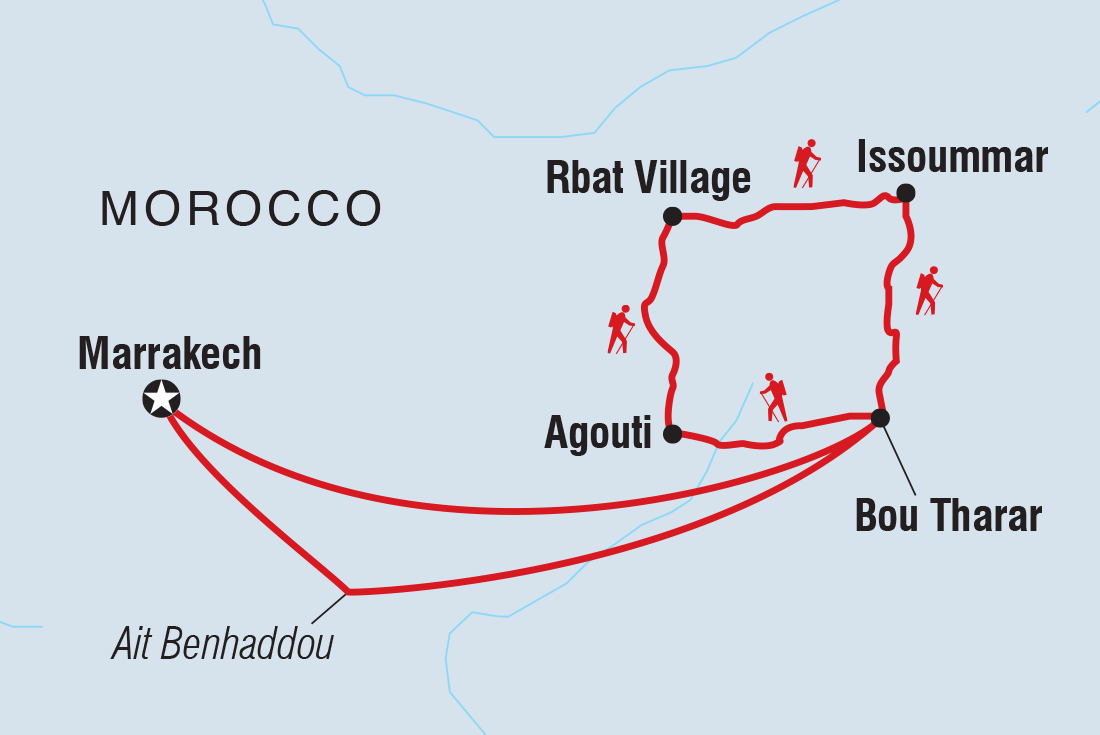


Salaam aleikum! Welcome to Morocco. Your Women’s Expedition begins in Marrakech with a welcome meeting at 6 pm tonight. If you arrive early, maybe check out Djemaa el-Fna – the lively town square in the centre of the medina. Singers, drummers, dancers, fortune tellers, jugglers and old medicine men mingle together in what has been called the 'greatest spectacle on earth'. You could also admire the outside view of the Koutoubia Mosque and its famous minaret or discover the tropical gardens of the French painter Jacques Majorelle (now owned by Yves Saint Laurent). After your meeting, maybe head out to dinner with your new group.
Board your private transport and settle in for the journey to Bou Tharar village. Here, you'll be hosted by local women and there will be Amazigh music and local songs with a tasty, traditional meal when you arrive. Your accommodation tonight is in a beautiful terracotta gite (rural guesthouse). From here, the views of the surrounding hills are superb, and you'll be greeted with warm hospitality from the local family who run the establishment.
Set off on a hike from Bou Tharar village to Agouti Village. For the next four days of hiking, you’ll be accompanied by one of the region’s first local female guides. Your guide knows these parts like the back of her hand and will share stories of the landscape and her nomadic past. You'll be hiking west, passing through villages and meeting some locals along the way. In the afternoon, learn how to prepare some specialty dishes during a cooking demonstration in the village. This is a unique opportunity, so get involved, learn how couscous is spread in the traditional way and learn some new skills to take back home!
Set off on a morning walk through Agouti Gorge, crossing through Almdoun Village to get to Rbat Village. The dramatic red walls of the gorge make for an otherworldly sight. Check out the detail of the striped mineral deposits while your leader provides some background information on the area. At some point during the hike, you’ll need to cross a river. Depending on the water levels, you may need to roll up your trousers and take your shoes off (or bring closed-toed sandals or water-proof shoes). Your leader will make sure to find the best place to cross but come prepared to get a little wet. When you arrive, gain insight into an age-old craft with a weaving demonstration run by a local woman from the village. After, take a walk through the village and settle in.
Sit down for a traditional Moroccan breakfast of homemade soup, tea, coffee and (most importantly) olive oil served with Moroccan bread. Get involved in preparing this flatbread (khobz), which is widespread and almost synonymous with Moroccan food. There's nothing like making and tasting the real thing under the guidance of those who do it best. Then, set off to Issoumar, trekking through more of Morocco's spectacular landscape. The route crosses small hills and leads to Timtda village, where you'll take a break and enjoy a picnic lunch. From here, climb 200 m uphill to the Tissardan pass, which offers a fantastic view of the M’Goun Valley. Then, descend 300 m to Issoumar village, where you’ll spend the night. This afternoon, listen to traditional folk tales and play music with the local women inside the guesthouse. Singing is a big part of local music, so expect to sing along with your female host – this isn’t a performance, but rather a unique opportunity to get involved and be a part of the experience!
Follow the M’Goun River back to Bou Thrar today. You'll most likely see a few farmers going about their daily business along the way. After lunch, visit the owners barn and learn some traditional farming skills that have been practiced in this part of Morocco for centuries. Take the chance to feed the animals – often a very important part of the life for local families, whose wealth depends on their livestock. After, take some time to rest before joining your fellow women in trying on some traditional henna and kohl makeup. You may have already learned about these skills earlier in the trip, but this evening stands out for a different reason. After having your dress picked out and make up done for you, you’ll head out to a very special party, imitating an Amazigh wedding. Have dinner here, mingle with the locals and learn more about their culture as the sun descends.
Return to Marrakech, stopping at Ait Benhaddou along the way – the iconic mudbrick ksar. Retaining its thousand-year-old allure, the UNESCO World Heritage site is southern Moroccan architecture at its finest and has been used as a backdrop for many famous films (like Lawrence of Arabia and Gladiator). When you arrive in Marrakech, you’ll leave the hustle and bustle of the medina and visit the home of Zineb – a local woman who will be cooking your dinner tonight. Tuck into a beautiful traditional meal as you hear how Zineb’s hard work and determination to provide for her children has led her to where she is today. To cap off your final night together, The Houariyates – a female music band that takes its inspiration from the original tribes of I'Houara and Hammadas – will perform for you. Their joyful songs praise and celebrate women and often speak of desire, sensuality and love.
Your adventure ends this morning and you're welcome to depart your accommodation at any time after check-out. If you would like to stay in Marrakech, just speak to your booking agent ahead of time to book additional accommodation.

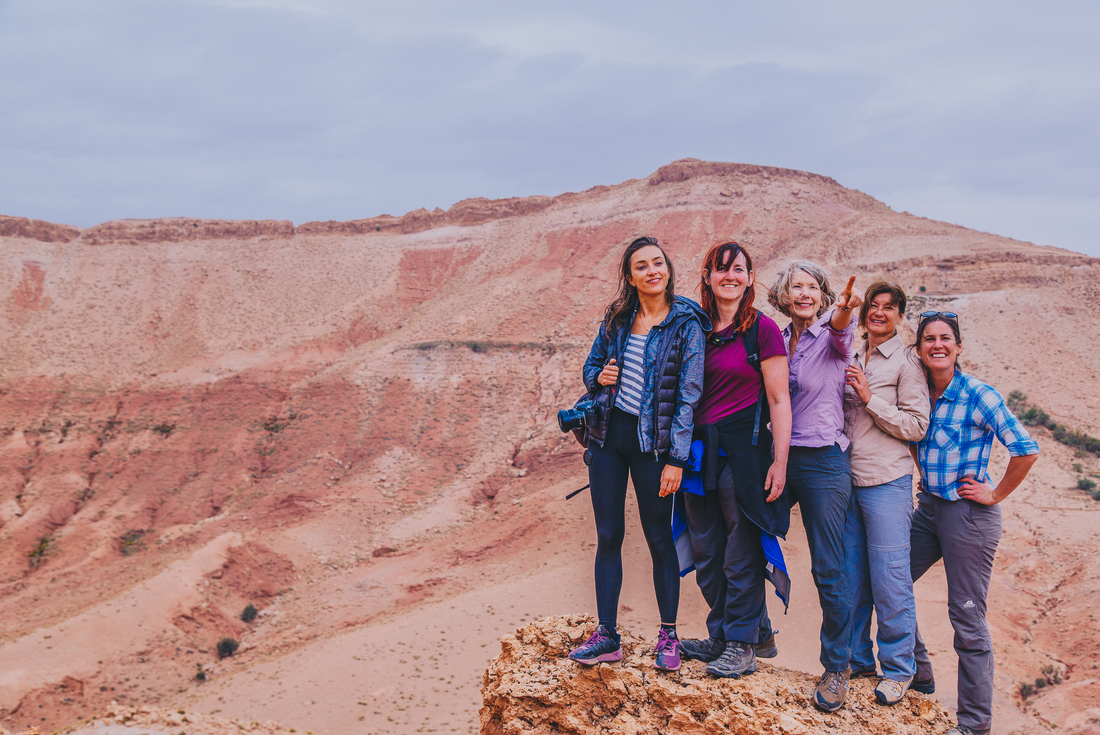
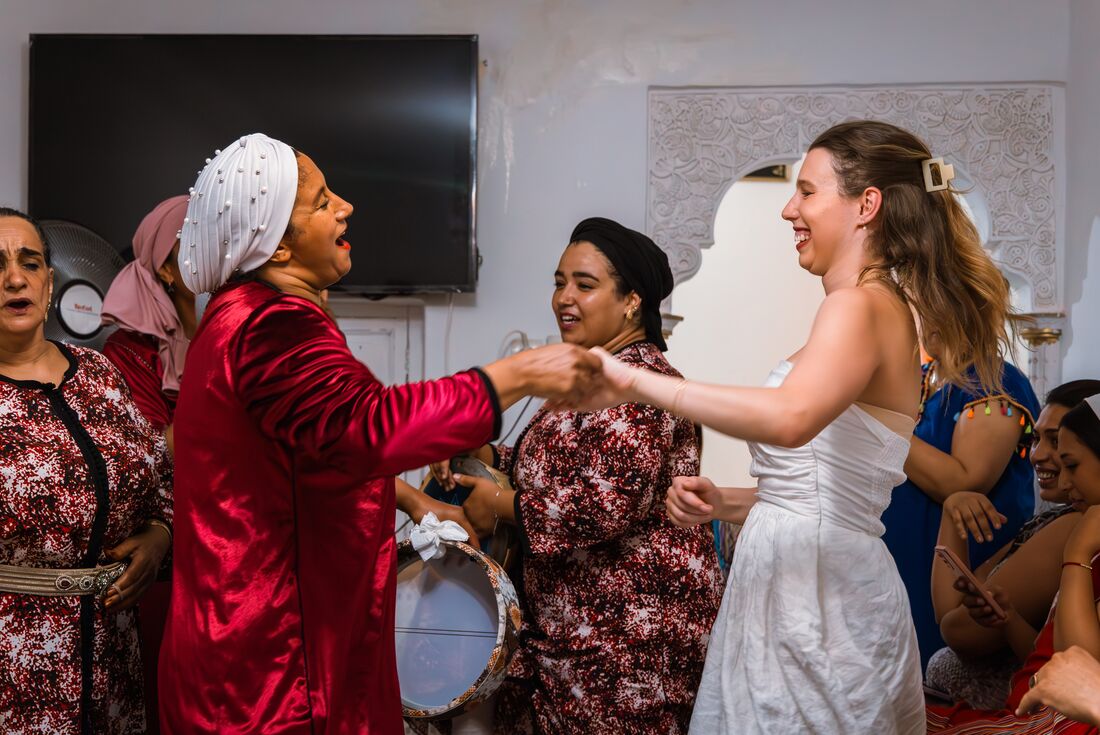
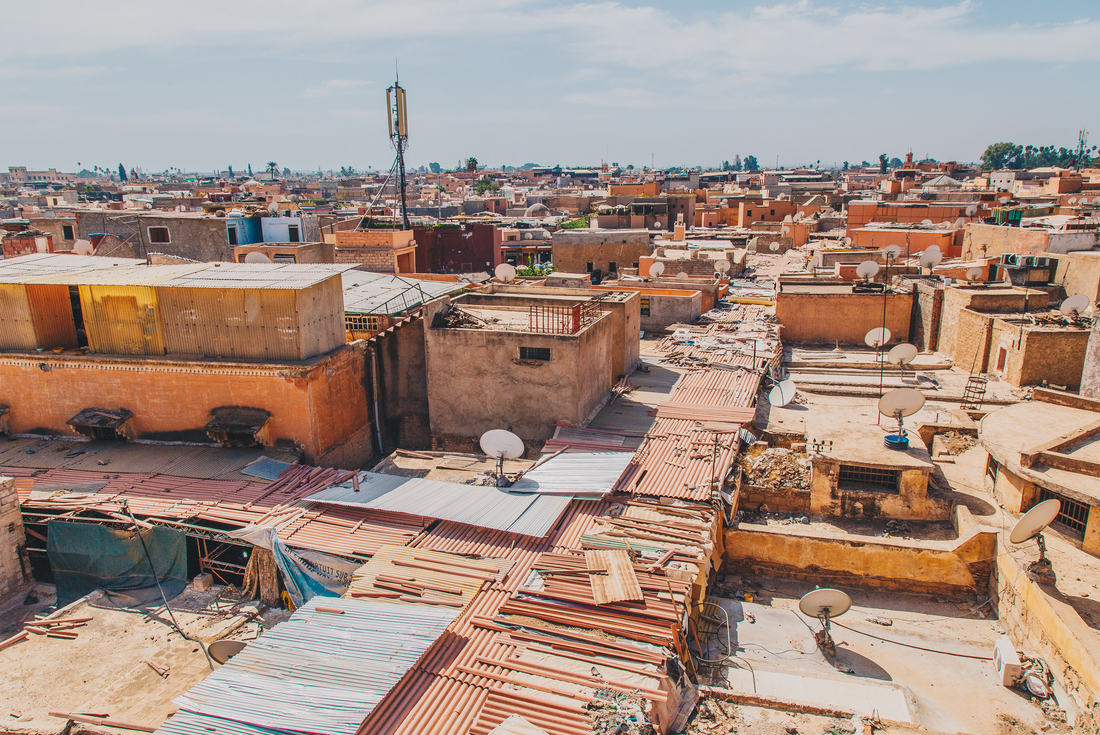
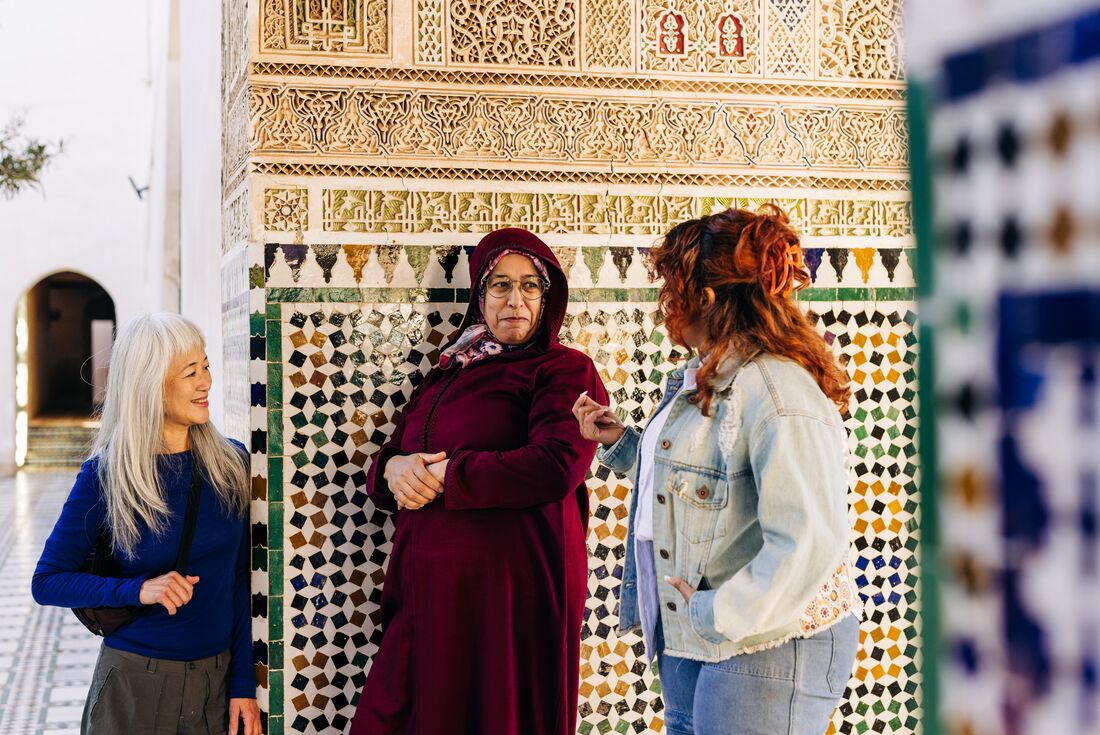
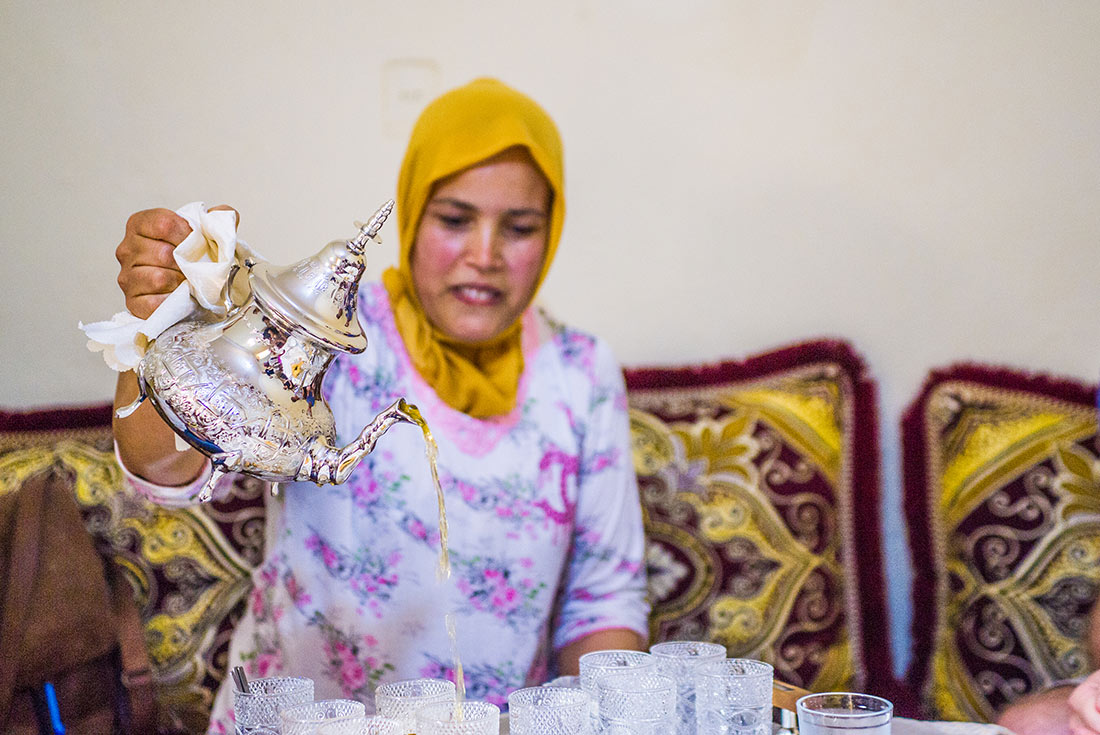
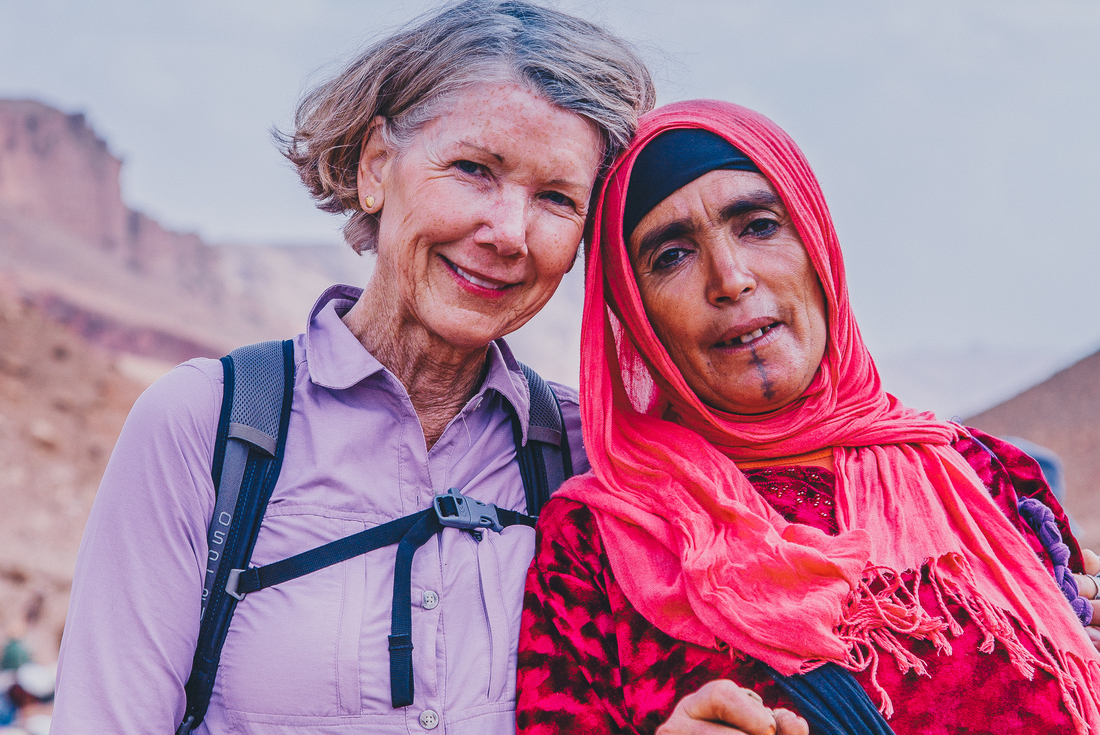
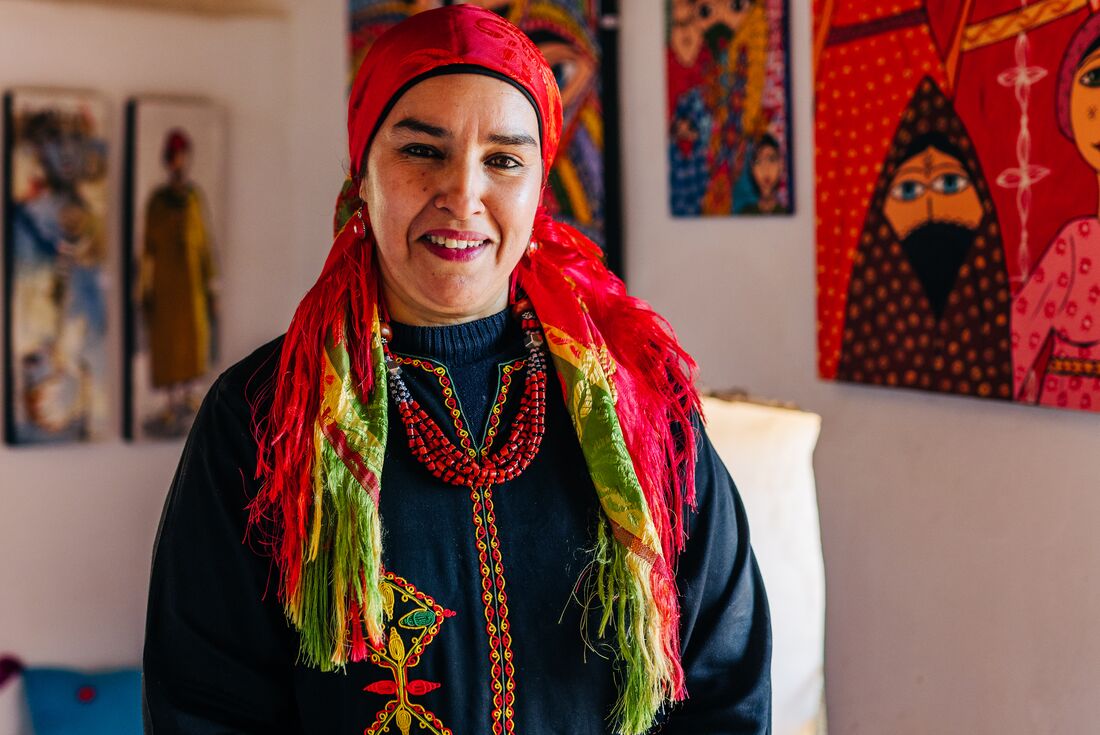
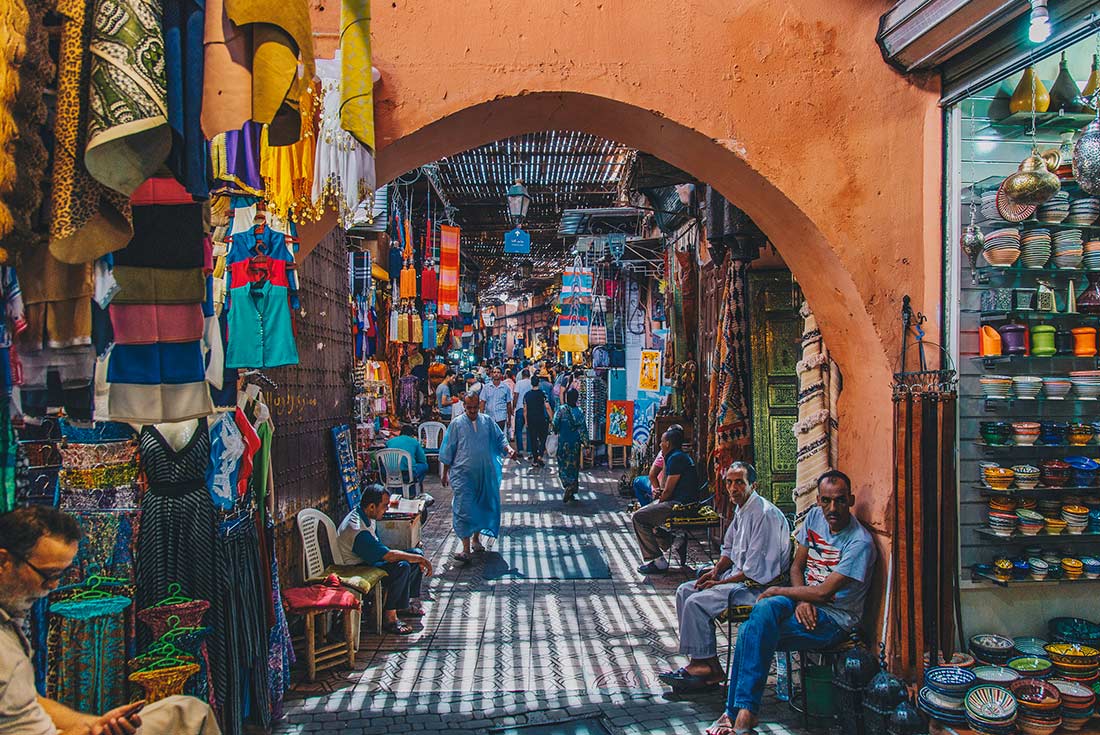
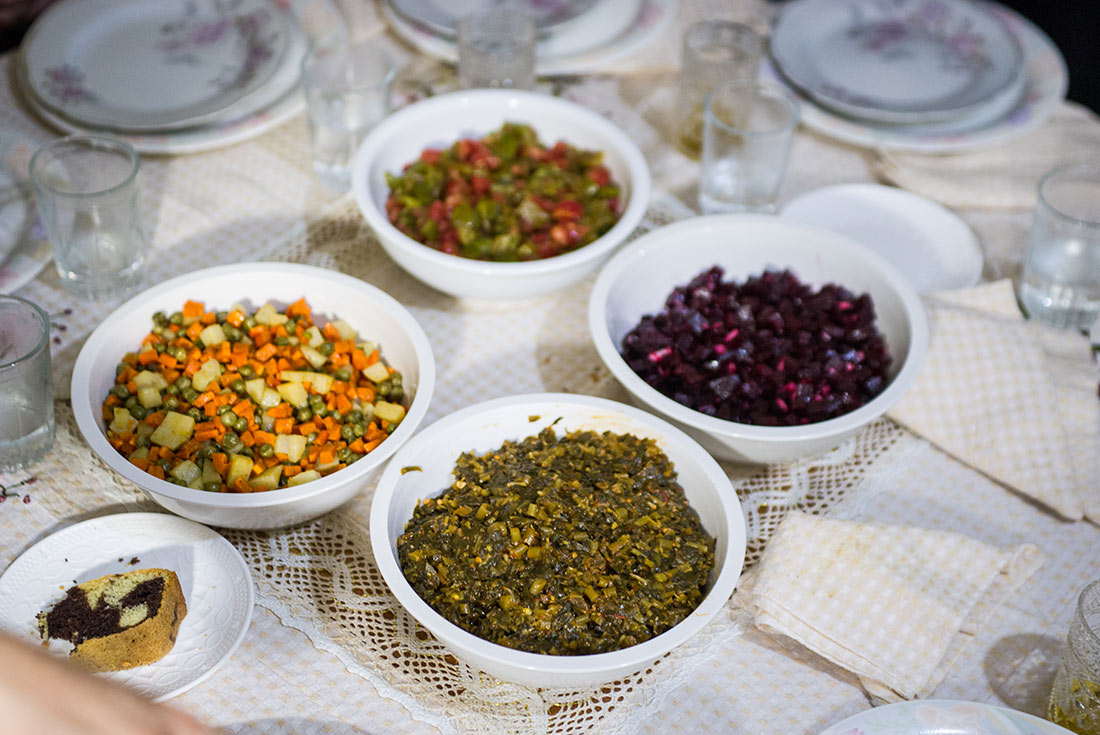
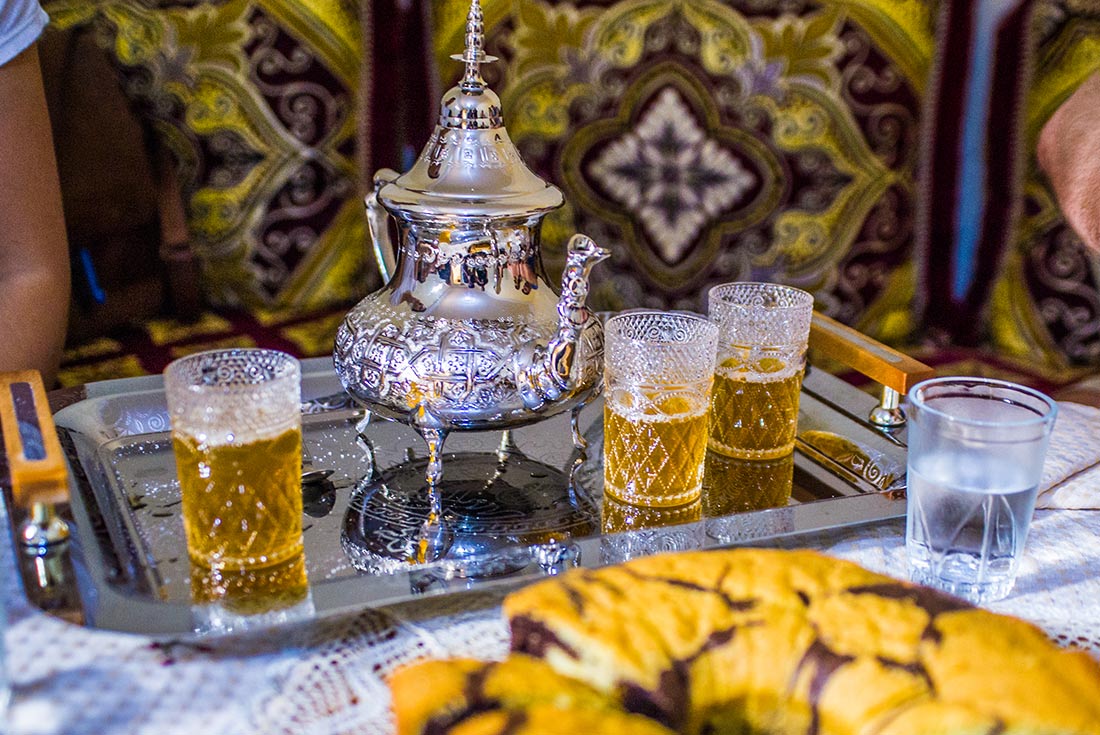
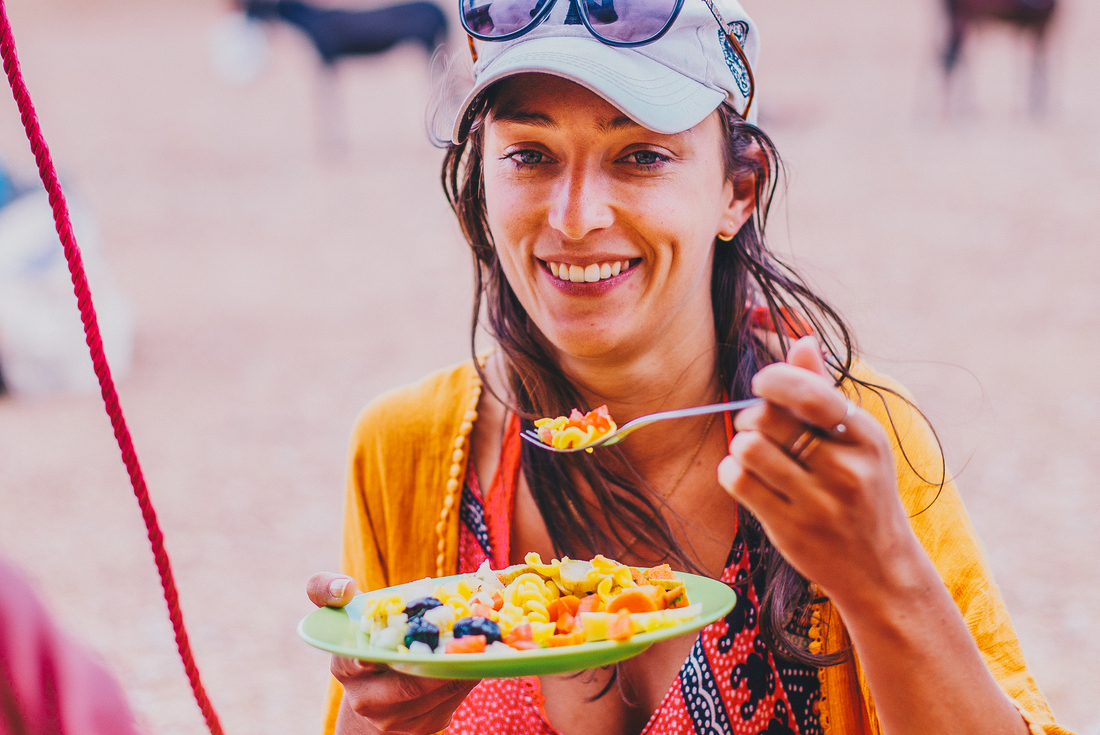
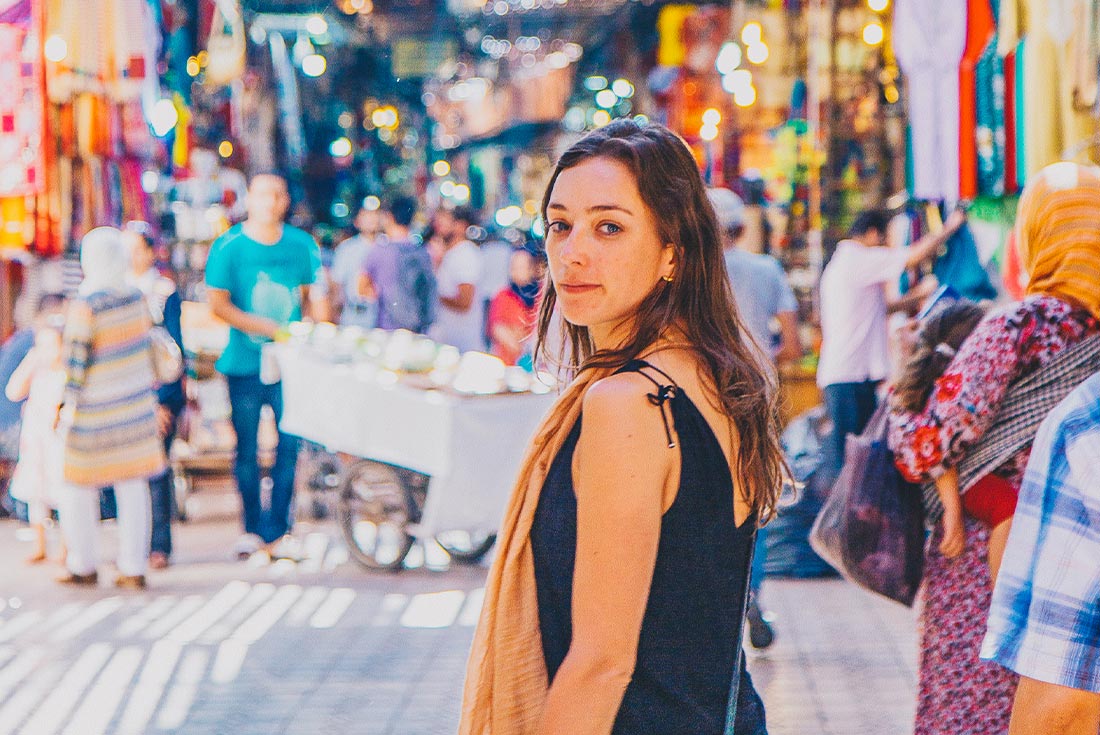
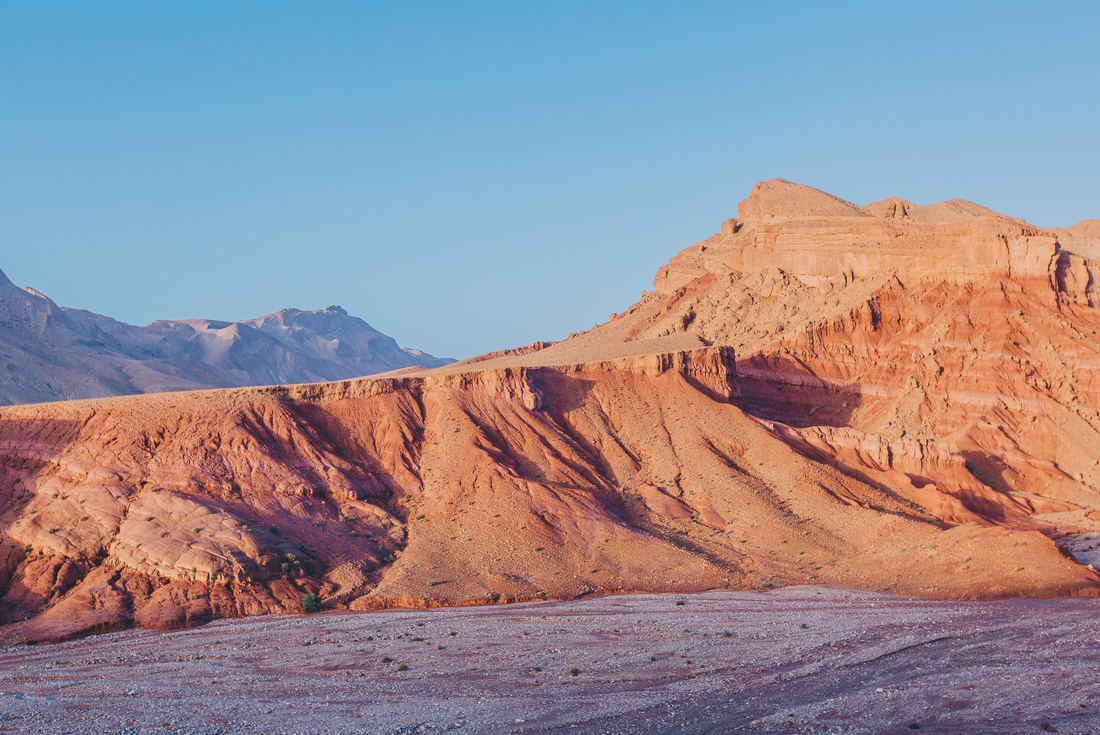
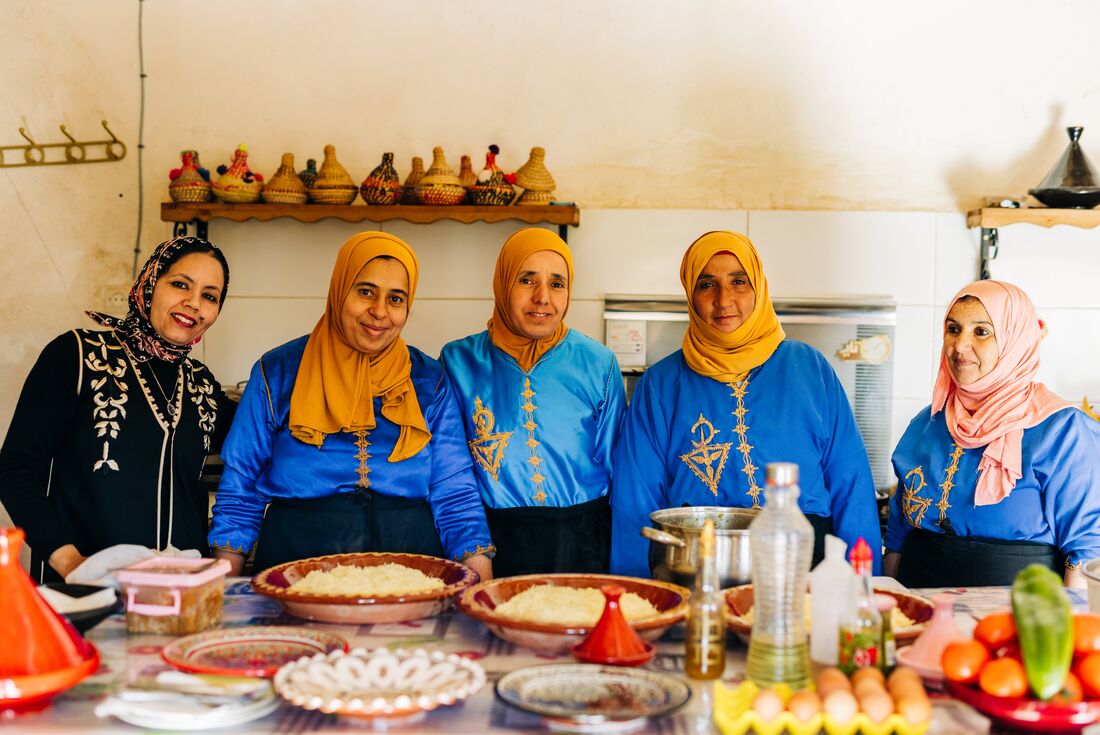
Bou Tharar - Amazigh music and local songs
Agouti - Couscous demonstration
Bou Tharar - Hike to Agouti
Rbat Village - Rug-weaving Demonstration
Agouti - Hike to Rbat Village
Amejgag - Moroccan breakfast preparation
Issoumar - Folk tales and music
Amejgag - Hike to Issoumar
Bou Tharar - Farm animal visit
Bou Tharar - Amazigh dress and make up
Issoumar - Hike to Bou Tharar
Ait Benhaddou - Leader-led ksar walk
Marrakech - Home-cooked dinner
Marrakech - Houariyates performance
Find out what it means to be female in Morocco as you travel with an all-women group, a local female leader, the M’Goun Valley’s first local female guide and meet plenty of inspiring women along the way.
Learn from the best as you take part in a traditional couscous cooking lesson, find out how to make fresh khobz (flatbread), and be welcomed into the home of a local woman in Marrakech for a meal you won’t forget.
Spend four days hiking between remote villages in the M’Goun Valley, accompanied by a local female guide who will bring the region to life with her incomparable knowledge and experience.
Dine on delicious local cuisine as you enjoy a private performance by The Houariyates – a female music band that will fill the room and your heart with joyful songs praising and celebrating women.
Visit the historic town of Ait Benhaddou and its iconic mudbrick ksar. You’ll soon see why this eye-catching site has been used as a backdrop in many famous films.
By travelling on this trip, you’ll learn about our Intrepid Foundation partner, Amal. Donations support them to provide women in Morocco with culinary skills training to help improve livelihoods. Intrepid will double your impact by dollar-matching all post-trip donations made to The Intrepid Foundation.
Hotel Palais Al Bahja, 33, Rue IBN AL QADI , Hivernage, Marrakech, 40000, MOROCCO, Phone: +212 524433001
Hotel Palais Al Bahja, 33, Rue IBN AL QADI , Hivernage, Marrakech, 40000, MOROCCO, Phone: +212 524433001
1. A single supplement is available if you’d prefer not to share a room on this trip. The single supplement excludes Days 2 and 6 (Gite) and Days 3, 4 and 5 (Guesthouse) where you will be in shared accommodation and is subject to availability. Please speak to your booking agent for further information.
2. Please refer to the trip specific packing list for the recommended items for this trip.
While we always endeavour to provide the best possible holiday experience, due to the nature of travel and the areas we visit sometimes things can and do go wrong. Should any issue occur while you are on your trip, it is imperative that you discuss this with your group leader or local representative straight away so that they can do their best to rectify the problem and save any potential negative impact on the rest of your trip.
We recognise that there may be times when your group leader or local representative may not be able to resolve a situation to your satisfaction - if this is the case, please ask the group leader or local representative to speak to their direct manager.
You may also choose to provide details in your online feedback, which we ask you to complete within 30 days of the end of your trip. Please do be aware that it is very difficult for us to provide any practical help after the trip is completed, so informing us while still travelling will give us the opportunity to resolve the issue in real-time., For general contact details please use the following page: https://www.intrepidtravel.com/contact-us, In case of a genuine crisis or emergency, you can reach our local office on the numbers below:
, Intrepid's Local Operator: +212 661922693
This trip involves walking from 4 to 7 hours on Day 3 to 6. The walks will lead you through picturesque valleys and rivers. The terrain may be unstable, rocky and hilly. Consider appropriate footwear and necessary clothing, including a warm jacket and raincoat., You’ll need to bring a 3/4 season sleeping bag on this trip. Even though you’ll be staying in guesthouses and gites, they may not be heated, so a warm sleeping bag is essential., The village accommodation on this trip is simple and you’ll be sharing rooms with other female travellers. On Day 5 there are two big rooms for the group so you may share your room with up to five other travellers. Bathroom facilities are shared, but you can expect a hot shower each evening.
Find out what it means to be female in Morocco as you travel with an all-women group, a local female leader, the M’Goun Valley’s first local female guide and meet plenty of inspiring women along the way., Learn from the best as you take part in a traditional couscous cooking lesson, find out how to make fresh khobz (flatbread), and be welcomed into the home of a local woman in Marrakech for a meal you won’t forget., Spend four days hiking between remote villages in the M’Goun Valley, accompanied by a local female guide who will bring the region to life with her incomparable knowledge and experience., Dine on delicious local cuisine as you enjoy a private performance by The Houariyates – a female music band that will fill the room and your heart with joyful songs praising and celebrating women., Visit the historic town of Ait Benhaddou and its iconic mudbrick ksar. You’ll soon see why this eye-catching site has been used as a backdrop in many famous films., By travelling on this trip, you’ll learn about our Intrepid Foundation partner, Amal. Donations support them to provide women in Morocco with culinary skills training to help improve livelihoods. Intrepid will double your impact by dollar-matching all post-trip donations made to The Intrepid Foundation.
All Intrepid group trips are accompanied by one of our group leaders. Your leader will be one of our Moroccan female leaders. The aim of the group leader is to take the hassle out of your travels and to help you have the best trip possible, but on this expedition, our leader will go a step further. She will be a bridge between a group and other females you will meet on this tour. She will provide information on the places you are travelling through and offer suggestions for things to do and see.
TRAVEL ADVISORIES & ALERTS
We recommend that you check your government's foreign travel advisory for the latest information about the destination before you travel. You will also need to ensure that your travel insurance covers you for all destinations and activities on your trip. We also recommend saving the phone number for emergency consular assistance for your government’s consulate in the destination/s you’ll be travelling. Links to travel advisories and any current travel alerts for our trips can be found here: https://www.intrepidtravel.com/travel-alerts
PERSONAL SAFETY
Ensure you have a secure method of carrying your passport, phone, credit cards and cash while travelling such as a money belt. Leave all other high value items, including jewellery, at home Use safety deposit boxes at hotels to store your valuables when available and ensure your luggage is lockable. Be aware of the risk of pick-pocketing and petty theft. Exercise caution when walking at night, don’t walk alone and stick to well-lit streets wherever possible. Be vigilant on public transport and look out for your fellow travellers. Take precautions such as carrying your bag in front of you and never leaving personal items unattended.
LGBTQIA+ TRAVELLERS
Intrepid welcomes all LGBTQIA+ customers on our trips, however we operate in parts of the world that are less accepting. We support LGBTQIA+ customers to travel to these destinations and are committed to ensuring they face no discrimination on any part of the trip we control. We recommend you visit Equaldex (https://www.equaldex.com/) and your government's foreign travel advice for LGBTQIA+ travellers when choosing your trip., https://www.intrepidtravel.com/safety-guidelines, SCAMS:
When walking through touristy areas of cities you may be approached by 'helpful' locals who want to show you where to go or take you to a local spice shop. They will either ask to be your local guide for the day or expect money when you arrive at your destination. Please note these people are not registered guides and will try and get as much money from you as they can. A friendly 'no thank you (or 'la shukran') should suffice.
WOMEN'S SAFETY:
Women should exercise caution when travelling in Morocco. While the risk of an incident occurring on your trip is very low, below are some things you can do for your safety and peace of mind when travelling:
- As with all travel, it’s important to use common sense and be vigilant.
- Respect local dress codes and customs, perhaps dressing more conservatively than you do at home.
- Avoid isolated areas when alone at any time of day.
- Lock your door when you are inside your room. Keep the door locked when you are leaving your room, even for a short time.
- If hotel staff need access to your room for any reason, request that they do this while you are out, or wait at the reception while they attend to any cleaning or repairs. For the protection of both our travellers and staff, our leaders worldwide are not permitted to be alone in a room with a group member.
- Always take a hotel card with you when going out so you know the address and contact numbers.
- Should you encounter any inappropriate behaviour, inform your leader straight away.
- For further information and advice, visit:
https://smartraveller.gov.au/guide/pages/female-travellers.aspx
https://www.gov.uk/government/publications/2010-to-2015-government-policy-british-nationals-overseas/2010-to-2015-government-policy-british-nationals-overseas#appendix-2-advice-for-women-travellers
PETTY THEFT AND PERSONAL SAFETY:
While travelling there is always the risk of pick-pocketing and petty theft, particularly in the more touristy cities. We recommend that you exercise caution when walking alone at night and encourage you to walk together and only on main, well-lit thoroughfares. Be particularly vigilant on public transport. Simple measures like carrying your day pack on your front, not hanging your bag over the back of your chair or on the floor and wearing a money belt will reduce any chance that your valuables should go missing.
FIRE PRECAUTIONS:
Please be aware that local laws governing tourism facilities in this region differ from those in your home country and not all the accommodation which we use has a fire exit, fire extinguishers or smoke alarms.
TRAFFIC AND DRIVING ON THE OTHER SIDE OF THE ROAD:
Depending on where you come from please note that drivers in this part of the world may drive on the opposite side of the road from what you are used to. Look both ways before crossing any road. Traffic can be a little more chaotic than you might be used to at home. Be aware!
PASSPORT
You’ll need a valid passport to travel internationally and most countries require your passport to have a minimum of 6 months validity, so remember to check the expiry date.
We need your passport information to get everything ready for your trip so it’s important that the information on your booking matches your passport exactly. Please take care to provide the correct details. We recommend carrying a copy of the photo page of your passport while travelling and leaving a copy at home with family or friends.
VISAS & ENTRY REQUIREMENTS
Many countries require a visa and obtaining the correct visa for your trip and any countries you may transit through is your responsibility. We recommend you check your visa requirements as soon as you have booked your trip. This will ensure you have time to prepare your documents and for your visa application to be processed. You can check the entry requirements for your nationality on your government's foreign travel advisories, consular websites or on our page here: www.intrepidtravel.com/visa-entry-requirements
Information not available.
Validity: 01 Jan 2026 to 31 Dec 2026
GENERAL HEALTH
All travellers need to be in good physical health in order to participate fully on this trip. For the safety and wellbeing of yourself and others, if you are unwell prior to travelling, please stay at home and contact us to make alternative arrangements.
When selecting your trip please make sure you have read through the itinerary carefully and assess your ability to manage and enjoy our style of travel. Please note that if in the assessment of our group leader or local representative a traveller is unable to complete the itinerary without undue risk to themselves and/or the rest of the group, we reserve the right to exclude them from all or part of a trip without refund.
You should consult your doctor for up-to-date medical travel information or for any necessary vaccinations before departure. We recommend that you carry a first aid kit as well as any personal medical requirements in their original packaging as they may not easily be obtained while travelling. If you are carrying medication, ensure you check your government's foreign travel advice for any local restrictions or requirements.
, DRINKING WATER:
As a rule, we recommend you don't drink tap water in Morocco, even in hotels, as it contains much higher levels of different minerals than the water you may have at home. For local people, this is not a problem as their bodies are used to this and can cope, but for visitors drinking the tap water can result in illness. Generally, this isn't serious, an upset stomach being the only symptom, but it's enough to spoil a day or two of your holiday. Bottled water is widely available and your leader can recommend safe alternatives when available. Water consumption should be about two to three litres a day. Rehydration salts, motion sickness tablets, and diarrhoea blockers are recommended for you to pack in your personal first aid kit.
ASTHMA:
For some travellers, the desert sand and dust can bring on bouts of asthma. If you suffer from asthma even occasionally, we recommend you bring your medication as it cannot be administered by your group leader and may not be readily available while you are travelling. A light scarf or face mask can also be helpful for all travellers.
HENNA TATTOOS:
Henna tattoos are commonplace in Morocco. You should be aware that some henna tattoos contain the chemical para-phenylenediamine (PPD), which can cause a painful allergic reaction, including swelling and an itchy rash in some people.
Moroccan food is, generally speaking, excellent though not particularly varied. Breakfasts usually consist of bread and jam with coffee or tea. Vegetarians can be catered for but there is a fairly limited choice of vegetarian cous cous and tajine or omelettes. This is particularly the case during the walking sections of the trip in remote villages in Morocco. Please note that if you have any special dietary requirements you should inform the Intrepid office prior to the trip. If you have a specific medical/dietary need (i.e. coeliac or vegan) you may find it helpful to bring some items of food with you from home.
SPENDING MONEY
When it comes to spending money on the trip, every traveller is a little different. You know your spending habits better than we do, so please budget an appropriate amount for things like optional meals, drinks, shopping, optional activities, and laundry. Make sure you have read the itinerary and inclusions thoroughly so you know what is included in the trip price and what you may need to pay for while travelling. , MOROCCO
The currency of Morocco is the dirham (MAD). ATMs are widely available in all major towns and cities. Credit cards are useful for large purchases such as carpets or ceramics from large stores, but generally they are not widely accepted. Please ensure you only use banks, licensed money exchangers, or hotels. We also suggest you keep your receipts. Do not change money with street touts as this is illegal. Changing money is easy and you will find banks and exchange bureaus in large cities, but they often only accept USD, EUR and GBP. In the desert and Atlas Mountains opportunities to withdraw or exchange money are limited., TIPPING
Tipping can be an appropriate way to recognise great service when travelling. While it may not be customary in your home country, it is an entrenched feature of the tourism industry across many of our destinations and is greatly appreciated by the people who take care of you during your travels. It is always best to avoid tipping with coins, very small denomination notes, or dirty and ripped notes, as this can be regarded as an insult rather than the goodwill gesture it is intended to be., OPTIONAL TIPPING KITTY
On Day 1 of your trip, your group leader or local representative may discuss with you the idea of operating a group tipping kitty, whereby everybody contributes an equal amount and your group leader or local representative distributes tips for drivers, local guides, hotel staff and other services included on your trip. Participation in this kitty is your choice, and you are welcome to manage your own tipping separately if you prefer.
The group leader or local representative will keep a running record of all monies spent, which can be checked at any time. Any funds remaining at the end of the trip will be returned to group members. These tips to suppliers are for great service and are in addition to the regular costs paid for the services supplied.
The tipping kitty excludes tips for your group leader or local representative., Optional tipping kitty for this trip: MAD 500 per person., YOUR GROUP LEADER OR LOCAL REPRESENTATIVE
Tipping your group leader or local representative is highly appreciated if you feel they’ve provided outstanding services throughout your trip. The amount is entirely a personal preference; however, as a guideline, the recommended amount is 4-7 USD or EUR per traveller per day (in a currency relevant to your destination). Of course, you are free to tip more or less as you see fit, depending on your perception of service quality and the length and involvement of your group leader or local representative on your trip., YOUR DRIVERS
You may have a range of drivers on your trip. Some may be with you for a short journey, while others may be with you for several days. We recommend tipping your drivers USD 2 – 4 per person per day (in a currency relevant to your destination)., CONTINGENCY FUNDS
We try to plan for every eventuality, but there are still some things beyond our control. We reserve the right to change an itinerary after departure due to local circumstances or a Force Majeure Event. In such emergency circumstances, the additional cost of any necessary itinerary alterations will be covered by you. Please note we are not responsible for any incidental expenses that may be incurred as a result of the change of itineraries including but not limited to visas, vaccinations or non-refundable flights. Make sure you have access to an extra US$500 for emergencies (e.g. severe weather, natural disasters, civil unrest) or other events that result in unavoidable changes to the itinerary (e.g. transport strikes or cancellations, airport closures). Sometimes these things necessitate last-minute changes to enable our trips to continue to run, and as a result, there may be some extra costs involved. The recommended amount is listed in USD for the relatability of universal travellers, however, local currency may be needed once in the country to cover these costs., COMMISSIONS
Intrepid understands that the receipt of commissions in exchange for recommending particular shops or services is ingrained in the culture of the tourism industry. For this reason, we have established a centralised fund for contributions from recommended suppliers so these can be collected and distributed back into the business. Actively managing the receipt of commissions helps us maintain the level of quality you expect on one of our trips. Travel is always an adventure so Intrepid cannot explicitly guarantee the quality of a product but we aim to provide the best value trips in the market. Please let us know via the feedback form completed after your trip if we are successfully meeting - or exceeding - this objective.
Most travellers prefer to take a small to medium wheeled suitcase, which is a great size for the packing capacity in our private vehicles. Whatever you take, be mindful that you will need to be able to carry your own luggage, handle it at airports, take it in/out of accommodation and perhaps even walk short distances. We recommend you pack as lightly as possible.
If your trip includes travelling on overnight trains or primarily using public transport, the smaller your luggage, the easier it will be to store under or above bunks. Large suitcases may not be able to be taken on board. A lockable bag or small padlock for your bag will be useful, especially when travelling on public transportation as well.
When you're exploring during the day, you'll also need a day pack/bag to carry water, a camera, a jacket and activity-specific items like a swimsuit, a waterproof pouch/bag for your phone, or hiking shoes.
Below we have listed the essentials for this trip:, https://www.intrepidtravel.com/packing-list, LUGGAGE
What you need to bring will vary according to your travel plans pre or post this trip. Generally speaking you should pack as lightly as possible. We recommend keeping the weight under 10kg / 22lb as your luggage will be carried by mules while you trek from one village to the next. For your own comfort and safety, luggage should be kept to an absolute minimum. The use of a backpack, soft sports bag or duffel bag is required - hard suitcases aren’t fit to be carried by mules. If you are planning to travel for longer period of time, and hard suitcase is more suitable luggage for you overall, you will be able to leave it at the hotel in Marrakech and take a smaller, soft bag for the time of trekking. Also, a day pack for carrying your essentials is a key. Your main luggage will be taken by mules and you will not have access to it during your trek. Essential everyday items must be carried by you.
VALUABLES:
Please try to avoid bringing unnecessary valuables. We strongly recommend that you photocopy all important documents e.g. air tickets, passport, vaccination certificate, etc. and keep the copies separate from the originals. While not valid, a photocopy makes it very much easier to obtain replacements if necessary.
PACKING LIST:
- 3/4 seasons sleeping bag for the winter months
- Day pack
- Torch/head torch
- Ear plugs and eye cover if you are a light sleeper
- Personal medications (plus extra)
- Sun Cream and sunglasses
- Anti-bacterial hand wash
- Insect Repellent
- Extra Batteries
- Wet wipes
- Warm trousers
- Long-sleeved thermal top and long johns
- Hiking boots with good ankle support
- Closed toes sandal, trainers or waterproof shoes to cross streams and rivers
- Waterproof jacket and trousers
- Toilet paper
- Towel
- Water purification tablets, WATER BOTTLE
Please bring your own water bottle to refill. Although it can be difficult to avoid bottled water when travelling, please use the water dispensers which are provided on some of our vehicles and at some of our accommodation. When unable to avoid bottled water, it is better to buy the largest available and distribute it into your smaller bottle for the day. Some travellers like to bring a bottle with its own filtration system or water purification tablets. If you are walking or trekking as part of your trip, you will need to carry at least 2 litres of water with you., DRONES IN MOROCCO
Please note that drones are not permitted to enter or be used in Morocco, neither for personal nor professional/commercial use.
Please note that as a desert country, Morocco can have extreme weather. In October, in remote mountain villages evenings and nights temperature can drop to 5 or even less degrees Celcius. During the day it should be pleasant if the sun is out, but it is important to be prepared for wind and possibly rain. Warm jacket is a must., EID AL-ADHA
Eid Al-Adha (Sacrifice Feast) will take place in Morocco on 26 – 27 May 2026. This festival honours the sacrifice Abraham made of his own son. In commemoration of this, an animal is sacrificed and divided into three parts: one-third of the share is given to the poor and needy; another third is given to relatives, friends and neighbours; and the remaining third is retained by the family. Please expect delays or complete suspension of public services during that time which may be disruptive to the trip schedule. For some, it may also be disturbing to see animals being sacrificed, as this can take place in public., RAMADAN
The important month of Ramadan is expected to be in progress 16 February to 18 March 2026 and the Eid ul-Fitr festival will be held directly at its conclusion for 3-4 days. Ramadan is a festival of sacrifice where the devout refrain from eating or drinking during daylight hours. During Ramadan, business hours are shortened, including opening hours at some tourist attractions. Alcohol is not permitted during daylight hours and many restaurants will be closed. While you should expect some delays and inconveniences during this period, the month is a fantastic opportunity to travel in a Muslim country and witness this unique period, particularly the nightly celebrations when the sun sets and the fast is broken. Please note that although the Eid ul-Fitr festival can also be a fascinating time to travel it's a period of national holiday. Most government offices and businesses will be closed and some tourist site opening hours may be affected.
Intrepid won't tolerate any kind of violence, harassment (whether physical, verbal or sexual), or disrespect toward fellow travellers, our teams or local communities.
To ensure the wellbeing of everyone on the trip, decisions made by your group leader are final.
Romantic relationships between travellers and group leader or local representative are not permitted while on trip.
Any behaviour that prevents your leader from continuing the itinerary as planned, breaks local laws or opposes any of these guidelines may result in Intrepid denying your booking or removing you from the trip.
If something concerns you during your travels, please speak to your group leader immediately. Alternatively, you can contact us on the emergency contact number detailed in the Problems and Emergency Contact Information section of this Essential Trip Information.
Due to the villages and locations we will be visiting, the accommodation on this trip, apart from Marrakech, is rather basic. You will stay in family run guesthouses and local gites. That means you will be sharing rooms with a few other travellers. Bathroom facilities will also be shared. While the accommodation is basic, it is clean, atmospheric and very authentic. Staying in gites and family houses will allow you to experience the way local people live in this part of Morocco.
For more details about accommodation, please check the day-to-day itinerary.
We will travel in a private minibus from Marrakech to Boutghra. The road may be windy at times so make sure you are sufficiently prepared if you tend to have difficulty with mountainous drives. From Day 2 onwards you will be hiking through rural Morocco. Please expect uneven, rocky paths, river crossings and some steady inclines. Nothing is too strenuous, but you should come prepared to walk for up to 7 hours a day.
Travel insurance is compulsory on all our trips for those travelling internationally. We require that, at a minimum, you are covered for medical expenses, including emergency repatriation. If you are travelling within your home country or region, please confirm before travel that you are entitled to access the public medical system easily should an accident occur. We strongly recommend all travellers have a policy that also covers personal liability, cancellation, curtailment and loss of luggage or personal effects. For international trips, you will not be permitted to join the group until evidence of travel insurance and the insurance company's 24-hour emergency contact number has been sighted by your group leader or local representative.
If you have credit card insurance, your group leader or local representative will require details of the participating insurer/underwriter, the level of coverage, policy number, and emergency contact number, rather than the bank's name and your credit card details. Please contact your bank for these details prior to arriving in-country.
For travellers who reside within the European Union, Switzerland or the USA, the requirement to purchase travel insurance cannot be compulsory. However, the purchase of travel insurance is still highly recommended, and each country you visit may have its own specific entry requirements. For example, some mandate travel health insurance for all foreign travellers, regardless of their nationality. Travellers from the European Union, Switzerland or the USA who decline travel insurance when travelling outside their home region must sign a Travel Insurance Waiver Form at the Group Meeting, recognizing personal responsibility for emergency medical and repatriation costs should they arise.
For assistance with travel insurance or other services, please visit the link below:
, https://www.intrepidtravel.com/booking-resources/our-services
As you travel on a group trip you will be exposed to all the pleasures and maybe some of the frustrations of travelling in a group. Your fellow travellers will probably come from all corners of the world and likely a range of age groups too. We ask you to be understanding of the various needs and preferences of your group - patience with your fellow travellers is sometimes required for the benefit of everyone's travel experience. Remember too that you have responsibilities to the group. If you are requested to be at a place at a certain time, ensure that you don't keep the rest of the group waiting. We have found time and time again that the very best trips we operate are those where the dynamics within the group work well - this takes just a little effort on your part. Due to privacy reasons, we are unable to provide you with contact details and any personal information about your fellow travellers booked on your trip prior to departure.
ITINERARY CHANGES
Our itineraries are updated regularly throughout the year based on customer feedback and to reflect the current situation in each destination. The information included in this Essential Trip Information may therefore differ from when you first booked your trip. It's important that you review this information prior to travel so that you have the latest updates. Due to weather, local conditions, transport schedules, public holidays, political unrest or other factors, further changes may be necessary to your itinerary once in-country. Your group leader or local representative will keep you up to date with any such changes once your trip is underway and has the authority to amend or cancel any part of the trip itinerary if deemed necessary due to safety concerns.